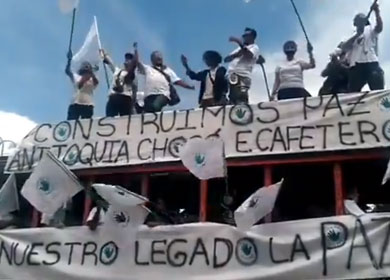More than a 1,000 members of the FARC from throughout Colombia took to the cities on Friday, demanding an end to the mass killing of former guerrillas who laid down their weapons.
Dressed in white, carrying white and Colombian flags, the former guerrillas had gone on a “pilgrimage” from their rural compounds to the cities to demand attention for the ongoing assassination of FARC members.
In some cities, former guerrillas sought dialogue with other civilians who in some cases had been terrorized by the FARC for decades.
Killings those seeking peace
 Since the former guerrilla group signed a peace agreement with former President Juan Manuel Santos four years ago, 236 FARC members who participated in the peace process were assassinated, according to their political party.
Since the former guerrilla group signed a peace agreement with former President Juan Manuel Santos four years ago, 236 FARC members who participated in the peace process were assassinated, according to their political party.
This year alone, 51 FARC members have been assassinated as well as 246 human rights defenders and community leaders, who are also being terrorized by the violence.
The mass killings have raised alarms in Colombia and in organizations accompanying the peace process, but seems to be met with disinterest by far-right President Ivan Duque.
Made invisible by pandemic, mass killing of Colombia’s social leaders continues
How not to implement peace policies
Duque has been reluctant to implement the peace deal since taking office in 2018 and the prosecution has been unable to effectively solve many of the murders.
The president’s Democratic Center party fiercely opposes the peace process. The hate speech promoted by some of its members is believed to incite some of the violence.
Attempts by the government to rewind the peace process have failed, but Duque’s failure to effectively implement key elements of the 2016 accords or otherwise reduce violence has been testing Colombians’ patience and sinking the president’s approval rating.
Why Colombia’s government opposes FARC terrorism victims
The skeletons in the closet
The peace process has slowly but surely changed society, especially among young people who were spared the armed conflict’s most intense period.
The process, however, has also gradually begun revealing parts of the conflict long kept under wraps, like the rampant corruption in politics and human rights violations committed by the state officials.
This has put Duque and his allies in the defense as terminology like “allies vs enemies” or “left vs right” no longer resonates.
The president is under additional pressure from the international community to implement the peace deal as agreed and act against the violence that is terrorizing much of the countryside.



